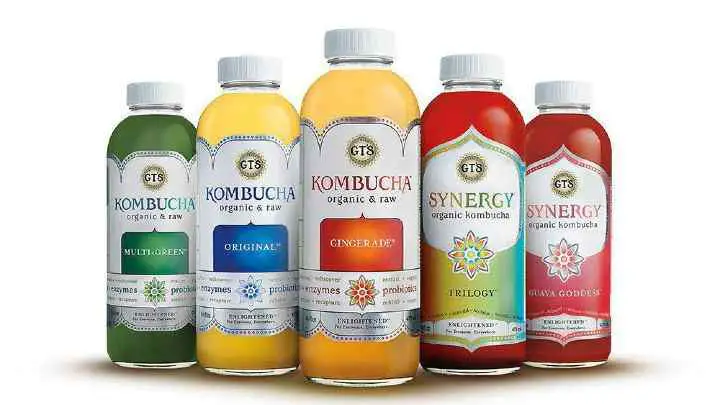Is Kombucha gluten-free? Yes, it is. Kombucha is a popular fermented tea beverage that has a long list of health advantages.
Since it is an Asian-derived beverage, it has several nutritional properties, making it a popular choice among those who wish to lead a healthy life.
As a result, you should finish reading this article. There are all the specifics about Kombucha, including what distinguishes it as gluten-free, how it’s created, and the health advantages it provides.
What Is Kombucha?
Kombucha is a tea-based effervescent sweet-and-sour drink with a 2,000-year history. The beverage originated in China, then moved to Japan and Russia.
Due to its reputation as a health and energy drink, it became popular in Europe in the early twentieth century and a phenomenon in the United States.
Kombucha is made from yeast, sugar, and black tea that has gone through a fermentation process. After a week or longer, the mixture is placed away. Bacteria, acids, and a little quantity of alcohol develop in the liquid during this period.
Fermentative bacteria, which can serve as a probiotic, are found in kombucha pathogens. It also has a healthy dosage of B vitamins, which aid digestion, cut toxins, and increase energy.
SEE: Are Hard Ciders the Best Gluten-Free Option for You?
Is Kombucha Gluten-Free?
Yes, it is. Kombucha is gluten-free because it is manufactured using substances that do not have any gluten.
Is Hard Kombucha Gluten-Free?
Yes, hard Kombucha is gluten-free. However, because various brands and techniques use different procedures, you should always look at the label to ensure your drink is genuinely gluten-free.
Is Rise Kombucha Gluten-Free?
Rise Kombucha is gluten-free, vegan-friendly, and devoid of genetically modified organisms. They’re healthy and produce the greatest Kombucha.
SEE: Is Mead Gluten-Free?
Is Synergy Kombucha Gluten-Free?
Yes, it is. Synergy Kombucha comes in a variety of flavors, including organic, raw, vegan, dairy-free, kosher, and gluten-free. Therefore, this provides drinkers with a diverse choice of alternatives.
Is All Kombucha Gluten-Free?
If Kombucha is made using the original ingredients and no additives, a higher percentage of it should be gluten-free.
However, this isn’t always the case, and there’s no guarantee that all Kombucha is gluten-free. If you suffer from gluten-related disorders, you should constantly be on the lookout for gluten-free Kombucha.
Is Kombucha Gluten-Free and Dairy-Free?
Yes, it is. Those produced in the United Kingdom are known for being vegan, gluten-free, and dairy-free. Kombucha should be dairy-free, but if you’re not sure, you can always check the label to see whether it is.
What Does Kombucha Taste Like?
Kombucha is a sour, bubbling fermented beverage with a tart flavor like sparkling apple cider. Based on the teas, fruits, and scents used in the procedure, the flavor might vary.
If you’ve never tried Kombucha before, it’s best to start with little amounts at first to get a feel for the flavor.
Why Do You Need a Gluten-Free Kombucha in Your Diet?
Kombucha is a fantastic choice if you prefer a healthy lifestyle with a lot of detoxication. It is also critical for those who are allergic to gluten and enjoy detoxicating tea to go for one which would not provide them with health risks.
Side Effects of a Gluten-Free Kombucha
Everything wonderful has a drawback, although one that isn’t always so terrible. As a result, while Kombucha may appear to be great for you, you should be aware that it may cause the following negative effects.
1. Excessive calorie intake
Kombucha flavors are available in a range of tastes. Some have few calories, while others have as much as 120 calories per bottle.
Consuming a Kombucha drink occasionally will not affect your midriff, but doing so every day could lead to unnecessary calorie consumption and weight gain.
People who routinely consume high-calorie beverages are far more likely to be overweight or obese than those who do not.
This is because caloric beverages are easier to digest and leave you feeling lesser full than strong calories.
SEE: Stand a Chance to Win a $500 Gift Card at Fresh Markert
2. Irritation in the stomach and intestines
Kombucha helps digestive health because it holds probiotics or beneficial bacteria. Nonetheless, because tea beverages are carbonated, they could promote bloating if drank in excess.
When carbonated beverages are ingested, carbon dioxide (CO2) is released into the digestive tract, causing bloating and gas.
Kombucha also has FODMAPs, which are carbohydrates that can induce digestive discomfort in certain people, particularly those with IBS.
Additionally, too much Kombucha might promote an increase in sugar intake, which can cause liquid to be drawn into your intestines, causing constipation.
3. Added sugar in large amounts
Most Kombucha beverages are sweetened with fruit juice or cane sugar to make them more appealing to customers.
While this may improve the flavor of Kombucha, it also increases the sugar content.
Artificial sweeteners, especially those present in sugar-sweetened beverages, can impair your health in a variety of ways if consumed in excess.
Higher incidences of diabetes, obesity, fatty liver, and heart disease have all been linked to sugar-sweetened beverages.
4. Dangerous for some individuals
Because Kombucha is unpasteurized and has bacteria and yeasts, it may promote the growth of aggressive microorganisms that can cause infections in some people.
Drinking Kombucha, for example, might create serious problems in people who have weakened immune systems, such as those who have cancer, renal disease, or HIV.
Although rare, ingesting potentially contaminated Kombucha has been linked to severe allergic reactions, acidity, and liver issues.
5. Excessive caffeine intake
Kombucha consists of black or green tea, both of which have caffeine. Even though Kombucha has less caffeine than traditionally brewed tea, drinking too much of it can be harmful.
As a result, caffeine-sensitive individuals may experience agitation or jitteriness if they take too much Kombucha. Additionally, drinking Kombucha just before bedtime may cause sleep problems.
SEE: Stand a Chance to Win a $1,000 Gift Card at Big Lots Store
FAQs
What’s in your Kombucha?
Kombucha is a tea-based fermented beverage. Made into a fermented, exuberant delight that we know and love by adding microbes to the brew, as well as organic cane sugar.
Is Kombucha vegan and gluten-free?
Yes, it is. Vegan Kombucha is available from several companies for those who follow a vegan diet. Furthermore, if made with the exact ingredients and under the right conditions, many Kombuchas are naturally gluten-free.
Is Kombucha a healthy drink?
Yes, it is. It aids digestion, cuts toxins from the body, and increases energy levels. It’s also supposed to strengthen your immune system, promote weight loss, prevent blood pressure and cardiovascular disease, and fight cancer.
Is it okay to drink Kombucha every day?
No, it is not okay. Realize that too much of anything is unhealthy for you, so drink in moderation, no more than one to three times each day, as the Centers for Disease Control recommends.
Does drinking Kombucha make you gain weight?
Yes, it can. This is because some of the microorganisms employed in the manufacturing process might encourage weight growth. As a result, it’s better to stick to four ounces of Kombucha every day.
Conclusion
Kombucha is a fantastic drink that can help with weight loss, strengthen your immune system, avoid heart and circulatory disease, and even prevent cancer.
As a result, it is more possible that the drink can accommodate all diets and allergies, particularly those who are gluten intolerant.
However, if not used in moderation, Kombucha might have negative health consequences.
Thanks for reading.
If you enjoyed reading this article, view Cheffist for more.






